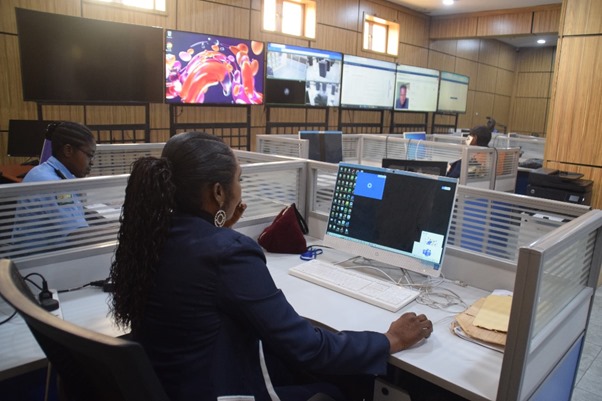NATIONAL DATA FUSION CENTRE: A GAME CHANGER IN THE CRIME MANAGEMENT
The surging population of youths with diminishing societal values copycat syndrome, and dwindling access to public revenue space have caused irrational minds to see crimes as the only alternative to getting rich quickly, to replicate the lavish standard of living being flaunted by individuals, thereby using the ill-gotten wealth to oppress others in society to the detriment of the dedicated, diligent and peaceful majority contributing to the development of the nation in lawful ways.
The conversation in the communities and the nation at large is about challenges of insurgency, banditry, kidnapping, cybercrimes, violent crime, terrorism, one chance/419, armed robbery, and transnational crime as well as economic saboteurs despite the success story of the security operatives in Nigeria who confronted these criminals with minimal personal protective gadgets.
These criminal activities have made everyone conscious and apprehensive of fellow citizens as the level of trust among individuals has diminished. The percentage of those causing these crimes is not more than five percent of the peace-loving 195 million people and their actions are on the front burner in every household.
The organization responsible for enforcing the internal security of this nation is the Nigeria Police Force which had its job cut out due to the enormous reportage of crime incidents in the country. The personnel available to the NPF has been stretched beyond the limit despite the support of other security agencies to curb crimes in the country, and yet it has not yielded the desired results.
The secessionists and nihilists among the population have further compounded the existing security challenges in the country. The meagre and highly expensive trained 350,000 personnel available to fight crimes in the country of about 200 million were being ambushed, maimed, and killed by these heartless and bloodthirsty elements.
Government at all levels and the private sector have been trying to boost the morale of the rank and file through the provision of numerous operational assets to tackle the challenges of crime in society; these efforts have not matched up to the enormous requirement assets that would enable them to perform optimally to curb nefarious activities of the criminals amidst the expanse of land to cover.
Currently, modern-day criminal activities are sophisticated, and those involved are highly creative and educated based on their access to information and communication technology tools. This has translated to evasion of arrest and loss of lives and properties in the country.
Criminal activities no longer have boundaries; it involves many people from different backgrounds, languages, sex, colour, and countries. They are cooperating in groups across the world to defraud, monitor, maim, and kill innocent citizens. This endemic situation is a worldwide phenomenon over which other nations have control through the effective use of data to curb crimes and arrest criminals in their environment. Modern policing predisposes a serious nation to have one single database, which Nigeria has not been able to do previously despite numerous data with various security organizations.
On assumption of office in August 2023, the Minister of Police Affairs, Senator Ibrahim Gaidam, observed that there was no adequate collaboration among the law enforcement agencies as they all operate independently in the area of information sharing. All security agencies have individual data that cannot be accessed by the Nigeria Police to curb and arrest criminals.
With the rising security challenges and threats in the country, he identified the strengthening of inter-agency collaboration through the sharing of vital intelligence and classified information to curb the menace.
The game changer is the construction of the National Criminal Data Fusion Centre (NCDFC) by the Federal Government through the Ministry of Police Affairs which is the main deliverable given to the Minister by Mr. President to tackle the security challenges being faced in the country.
The National Criminal Data Fusion Centre (NCDFC), also known as the Data Collection and Registration Centre (DACORE), which is the heart of the progress of the West African Police Information System (WAPIS) is now fully functional. The NCDFC when fully executed will incorporate the existing Data Collection and Registration Centre (DACORE) which is presently operating under the West African Police Information System (WAPIS).
The centre is the hub for the collation of information on criminal proceedings from various law enforcement agencies. The subsequent analyzed information will be shared with relevant agencies and partners as it will significantly enhance our capability to track and neutralize threats.
Similarly, the Data Collection and Registration Centre (DACORE) serves as the epicenter of data collection efforts, consolidating vital information that would empower law enforcement agencies to respond swiftly and effectively to emerging threats.
Within a year, the Minister has facilitated key agencies to fully embrace the WAPIS initiative, while others are gradually picking up. They are now equipped with WAPIS terminals, allowing them to access critical information and significantly enhance the collective efforts to combat crime and maintain security.
Given Nigeria’s dedication to capacity building, the Ministry has organized more than six training sessions, some of which were expertly conducted by our national trainers. This investment in training ensures that our law enforcement personnel are not only proficient in using the WAPIS system but are also well-prepared to harness its full potential in safeguarding our nation.
The Ministry knowing fully well the need for cooperation among security agencies organized a three-day workshop on Interagency Collaboration WAPIS with the theme: Interagency Collaboration Among Law Enforcement Agencies in Nigeria with the participation of officers from the Nigeria Police Force (NPF); Nigeria Navy (NN); Federal Road Safety Corp (FRSC); Nigeria Immigration Service (NIS) National Drugs Law Enforcement Agency (NDLEA); and National Financial Intelligence Unit (NFIU). Others are the National Identity Management Commission (NIMC); Economic and Financial Crime Commission (EFCC); Nigerian Correctional Service (NCoS); Nigeria Security and Civil Defence Corps (NSCDC); and the National Agency for Prohibition of Trafficking in Person (NAPTIP) as well as Nigeria Custom Services (NCS).
To make the apprehension of criminals in the country seamless, the Ministry has upgraded the existing Nigeria Police Crime and Incident Database Centre (NPCIDB). This has enabled police to document criminals’ data through biometrics of criminals from Divisional Police Stations across the country and digitally forwarded to the NPCIDB located in the National Criminal Data Fusion Centre.
The government is leveraging existing facilities to establish the NPCIDB which is domiciled with the Nigeria Police Force and in line with the global practice in many countries that the Police is the custodian and repository for criminal databases and other related matters. NPCIDB has already been deployed in the 36 States and the FCT.
These efforts by the Ministry have enhanced the capacity of the Nigeria Police Force to work with Interpol to apprehend trans-border and local criminals swiftly and accurately based on the digital data available to all security agencies. The Ministry is working with heads of security agencies and his counterparts in the Ministry of Defence, Interior, and National Security Adviser to consolidate the interagency collaboration and most importantly bring the Nigeria Army and others on board to ensure seamless collaboration.
The current report from the Defence Intelligence Agency (DIA) indicated that crime and criminality have been reduced by at least 65 percent in frequency since the inception of the current administration which is in tandem with efforts of the security agencies including the Nigeria Police Force in the country. Chief of Defence Intelligence (CDI), Maj Gen Emmanuel Undiandeye, said this while welcoming participants to the Chief of Defence Intelligence Annual Conference 2024, with the theme, “Exploring the Role of Technology in Strengthening National and Regional Security.”
What remains for the federal government is to improve funding for the Ministry of Police Affairs so that it can implement most of the cutting-edge policies and infrastructures that would enable the Nigeria Police Force to be ahead of criminals in the country.
Bolaji O. Kazeem
Head (Information & Public Relations)




